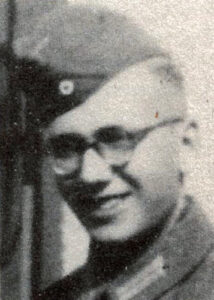Mail Correspondence with Soldiers at War (“Feldpostbriefe”): Last letter of German soldier Gerhard Schulze from Russia, 22 March 1945 (Published on 22/07/2024)
Feldpostbriefe and their significance today
When researching Julius Erasmus, one inevitably comes into contact with letter correspondence between soldiers at war and their families from the time of the Second World War, such correspondence being called “Feldpostbriefe” in German. Be it messages about the death of a soldier, written by his superior to his relatives, which were later sent to Mr Erasmus as a hint for a grave search, or other correspondence between soldiers at war and their families at home. Since then, I have also been dealing more closely with field post letters from that time.
Feldpostbriefe are valuable contemporary documents that unfold their timeless message, especially in times like the present, and convey a vivid impression of what war means to all involved. They are a valuable tool to ward off the very beginnings of a renewed striving for war and perhaps to help prevent history from repeating itself once again and with yet more gruesome consequences for mankind. At present, war, weapons and the killing of people on a large scale are once again being drummed up forcefully, although for decades one could have had the vague hope that mankind had finally learned its lesson to some extent from the painful experiences of two world wars in particular. Unfortunately, this does not seem to be the case once again.
With this in mind, appropriate letters or letter excerpts from various sources will be published here from time to time in the section “Mail Correspondence with Soldiers at War (Feldpostbriefe)” as a reminder of what war means to man and mankind. To provide food for thought and in the unshakable hope that this may make a difference.
Last Feldpostbrief from Private Gerhard Schulze to his parents, dated 22/03/1945 (source: Volksbund Deutsche Kriegsgräberfürsorge, Letzte Lebenszeichen – Briefe aus dem Krieg, p. 191 ff. (translation from German language)):
“East, 22/3/1945
My beloved, good parents!
And once again the good Lord saved me from a horrible fate! At 4:30 a.m. on 15/03/ (I had just been relieved at my post), the Russians started an insane barrage, which was not interrupted for even 2 seconds, from and to all sides. It only died down a bit around 3 p.m. But there was a lot going on up to that time! At around 8 o’clock in the morning, the Russians came over the heights into our forest, where we had just finished building a bunker. We had to pile out and leave all our things behind. Now nobody had anything left. We were caught in a terrible fire and lay flat in the dirt for a full 20 minutes. I’ll never forget how one impact after the other surrounded us. Thank God we didn’t take a direct hit, we only had one wounded man. I was lucky too, a splinter hit my cookware lid, otherwise I would have got the thing in the back.
We were surrounded by the Russians, an experience you can never forget. We were on the move for 4 days and nights without a break, always running, hoping that we would get out somewhere. We had infantry fights, but had to keep going. After we also had to leave the equipment, we walked 120 km, a feat I would never have dared to do. I could no longer feel my legs, my feet were covered in blood. I had always asked God for help, and he helped me. I got out of the cauldron with him. We fought our way through the night, but many of my comrades didn’t make it.
My best parents, I am writing briefly today, we are now in a village for assembly, and then go back to work. We now have to get ourselves ready, and my feet are almost unusable after I took off my shoes and the stockings stuck to my feet. But this effort was not entirely in vain, we are out for the time being – even if there are only 10 of us 20. Hopefully it won’t happen again. (I’m fine now, and we’ll take advantage of the few days’ rest to recover).
How are only you and our dear rabbit? Due to the scattering of our troops in the cauldron, I had to be assigned to a new unit, hence the new F.-P. number [field post number]. I don’t know if there’s any point in writing to me. I think about you a lot. Hopefully everything will come to an end now. With love and affection, I am your Gerhard with warmest greetings and kisses. There’s not much time today, I want to write to Gerlinde right away, maybe tomorrow!
Will you have a quiet birthday today? God grant it!
Your Gerhard”
Gerhard Schulze’s field post letter to his parents was his last sign of life; it bears the postmark “Neisse”. Gerhard Schulze was born on 31/01/1923 in Leipzig, he is still missing in action today.
(Head picture: German Military Cemetery Lohrer Wald
near Bad Kreuznach, August 2021)
If you wish to support my work, you can do so here. Many thanks!


